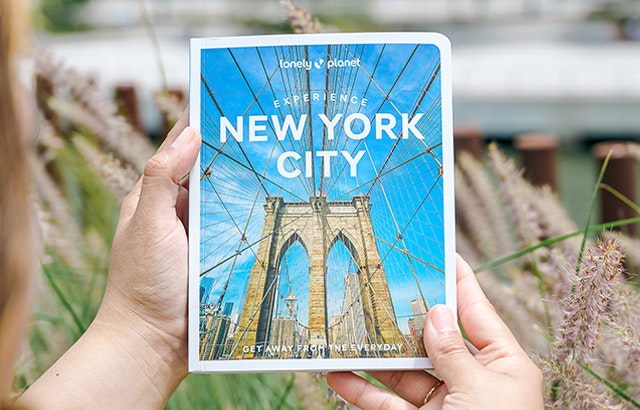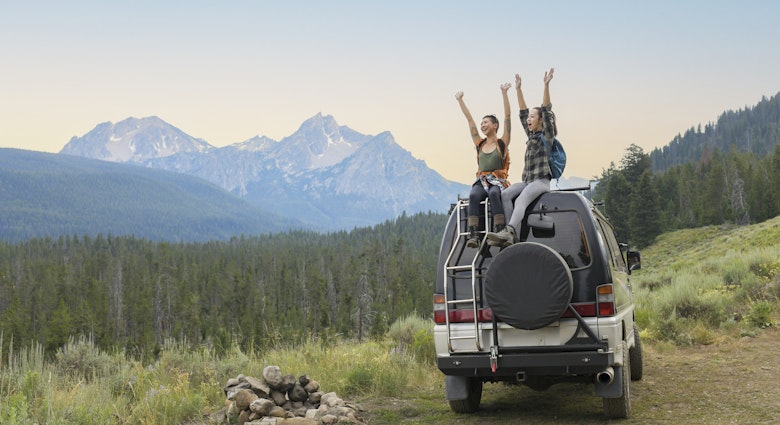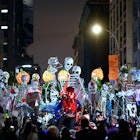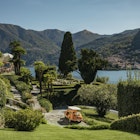It isn’t hard to find a bit of respite from New York City’s clamor. Really.
World-famous landscapes, tiny “pocket parks,” community gardens and many hundreds of acres of woods (really!) make up Gotham’s archipelago of over 1700 green spaces, all of which offer an alternative to the skyscrapers and crowds.
While it’s tough to pick favorites, here are 13 of what we think are the best parks in New York City.
1. Central Park
New Yorkers and visitors from all over the world savor Central Park’s 843 acres of rolling meadows, boulder-studded outcroppings, elm-lined walkways, manicured gardens, multiple ponds and a reservoir. Drama lovers head to the Delacorte Theater each summer for alfresco Shakespeare performances, while Beatles fans pay tribute to John Lennon at Strawberry Fields. Kids meet sea lions at the Central Park Zoo and scamper on the giant Alice in Wonderland–inspired sculptures. And bird-watchers get lost in the wild-feeling Ramble and North Woods.
The park is a magnificent artwork in itself, shaped by the great Frederick Law Olmsted and Calvert Vaux in the 19th century as a leisure space for all New Yorkers regardless of color, class or creed. To this day, the park offers whatever form of recreation you might be looking for, from tennis and roller skating to model-boat sailing or just sunbathing for hours.
If you visit only one park in NYC, make it this grande dame.
2. Brooklyn Bridge Park
Where piers and former industrial buildings once rotted, one of the city’s most beloved, relatively new attractions has taken shape. This 85-acre park extends along a 1.3-mile bend on the East River, a once-barren stretch of shoreline that has been developed into a landscaped gem with jaw-dropping views of the world-famous Brooklyn Bridge and the Manhattan skyline. There’s lots to see and do here, with playgrounds, walkways, ballfields and lawns galore – plus one of the city’s most enchanting carousels. There are also a few seasonal restaurants.
3. Hudson River Park
A block away from one end of the High Line, where stevedores once hauled cargo from freighters, a brilliant four-mile public park has taken shape over the past two decades. Covering 550 acres (400 of which are on the water) and running from the Battery at Manhattan’s southern tip to 59th St in Midtown, Hudson River Park is Manhattan’s wondrous side yard. The long riverside path is a great spot for cycling, running and strolling.
Several boathouses (including one in Chelsea near W 26th St and another in the West Village near Houston St) offer kayak rentals and longer excursions for more experienced paddlers. Families with kids have loads of options, including four playgrounds, a carousel (off W 22nd St), mini-golf and grassy piers for young legs to run free. And on sunny days, the lawns of Pier 45 (at Christopher St) teem with very toned, minimally clothed sunbathers, making for some of the best people-watching in town.

4. Prospect Park
Among Brooklyn’s necklace of wonderful green spaces, the crown jewel is the 585-acre Prospect Park. Its designers, Frederick Law Olmsted and Calvert Vaux, considered it an improvement on their earlier New York project, Central Park – and between wandering its tree-fringed walkways and sighing under its ornamental bridges, you might agree. At the LeFrak Center at Lakeside, there is ice skating in winter and roller skating in summer.
Like its Manhattan cousin, Prospect Park looks like a natural wonder, yet was entirely landscaped by humans. A long meadow on its west side is filled with dog walkers, athletes and barbecuers, depending on the season; a charming boathouse on the east side sits picturesquely on a lake. The neoclassical arches, sculptures and columns at the major entrances were later additions.
5. Flushing Meadows Corona Park
Since Queens might be the most international place on Earth, it’s fitting that the world’s biggest globe sits smack dab in the middle of its best-loved park. At 120ft high and weighing 380 tons, the stainless-steel Unisphere is indeed iconic. Yet it’s the people who fill the nearby fields and pathways that make Flushing Meadows Corona Park truly stand out.
Once the site of two World’s Fairs (in 1939 and 1964) and adjacent to the USTA Billie Jean King National Tennis Center (home to the annual US Open) and Citi Field (home to baseball’s NY Mets), these 1225 acres today play host to soccer tournaments, food trucks, a wonderful art museum, family picnics and much more. Visit for a taste of why New York remains a truly global city.
6. Staten Island Greenbelt
Staten Island’s natural beauty has always delighted conservationists, with 19th-century figures as prominent as Henry David Thoreau and Frederick Law Olmsted celebrating the ecological richness of its hills. Decades later, hard work and passionate preservation efforts have resulted in the Staten Island Greenbelt, a contiguous series of wooded reserves that spans an astonishing 2800 acres.
For a few hours, you can leave the clamor of New York City behind as you listen for bird calls, look out for bullfrogs and experience nature in its elemental glory along the park's family-friendly, color-coded hiking trails.

7. Washington Square Park
Neighborhood seniors share benches with MCs selling self-produced CDs. NYU undergrads dodge performance artists, feisty protesters and toddlers running toward the fountain. By the magnificent arch, musicians play, dogs scamper and the scent of weed lingers. If Greenwich Village contains all manner of colorful characters, Washington Square Park is where you’ll find them all strutting their stuff.
A gorgeous arch and historic row of townhouses along the park's fringes speak to the site’s elegant past. The space has long embodied the mosaic of the Village’s bohemian vibe and has been a center for activism for many decades.
And after years of renovations, it’s never looked better, with a big new playground, public restrooms, a dog run and the famous “mounds” now covered in artificial grass for children’s enjoyment. But it’s the blend of people that gives the park its soul. Park yourself on a bench for a few hours to soak it in.
8. Battery Park
At the very lower tip of Manhattan, this historic park has been a site of commerce, remembrance and recreation since the Dutch arrived in 1625 (establishing a defensive “battery” overlooking the harbor). Newly restored landscapes filled with native species and wildflowers lie in between a series of moving memorials, including those who died in the Korean War and members of the Merchant Mariners.
It’s also the site of the beguiling SeaGlass Carousel, the historic Castle Clinton and the gateway for ferries to Ellis Island and the Statue of Liberty. (A warning: only one company, Statue City Cruises, sells tickets to the iconic monument. If you didn’t purchase them online, buy them at the ticket office in Castle Clinton. Don’t buy them on the street.)
9. Fort Greene Park
Forts from the Revolutionary War and War of 1812 were retired by 1847 when this tract of land became Brooklyn's first park – a measure that was championed by Walt Whitman, then editor of the Brooklyn Daily Eagle.
By 1896, Calvert Vaux and Frederick Olmsted – designers of Central Park and Prospect Park – were resculpting its rugged expanse. Today, it's popular for its lawns, tennis courts, ball fields, playground and dog run.
10. Van Cortlandt Park
North of the Bronx, this sprawling 1150-acre beauty combines bucolic pursuits you might not realize are available in New York City – like horseback riding, hiking and golf – with hundreds of acres of ballfields that draw cross-country runners, soccer leagues and an ever-growing community of cricketers.
Visit the Van Cortlandt House Museum for a taste of NYC’s plantation past (the park derives from the Van Cortlandt family’s vast holdings) – then take a wander or pedal down the Putnam Greenway, a former rail line that is especially beautiful in fall.
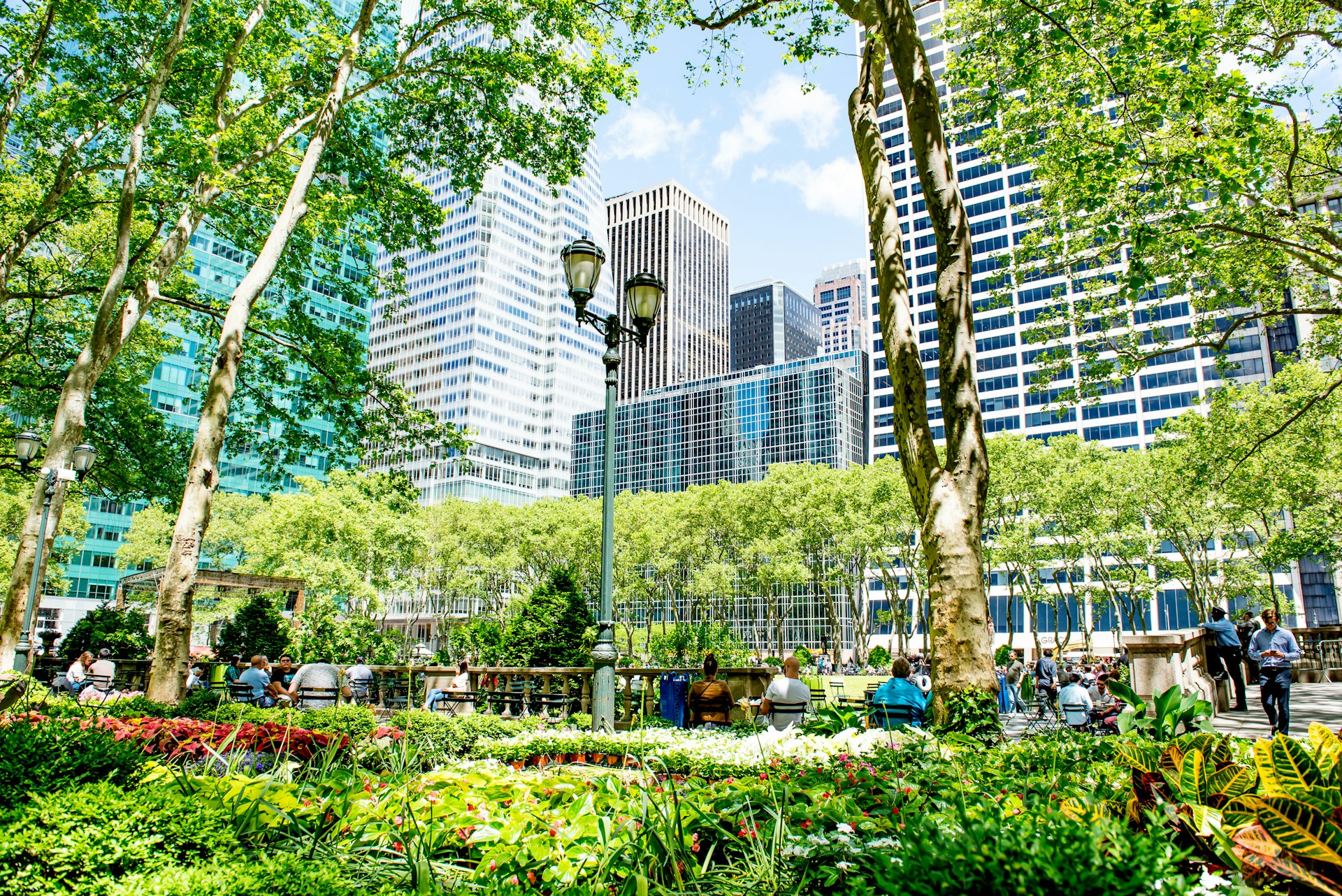
11. Bryant Park
Coffee kiosks, alfresco chess games, summer film screenings and winter ice skating: it’s hard to believe that this leafy oasis was a crime-ridden hellscape known as “Needle Park” in the ’70s. Nestled behind the beaux-arts New York Public Library building and surrounded by vertiginous buildings, it offers the space New Yorkers need to slow down from the Midtown madness for a few minutes.
Among the park’s most whimsical attractions is the French-inspired, Brooklyn-made Le Carrousel. Frequent special events include alfresco summer movie nights, popular with post-work crowds lugging cheese-and-wine picnics.
12. Riverside Park
This four-mile strip of greenery connects Upper West Siders to the shoreline of the Hudson. The park first took shape in the late 19th century following a plan by the omnipresent Frederick Law Olmstead, with swathes of green snaking along the ridge traced by Riverside Dr. (the grand apartment buildings developed across from the park remain some of the city’s finest). In one of his first grand projects, master administrator Robert Moses in the 1930s redeveloped what had been waterside rail yards, adding a series of terraces (and a four-lane highway) to connect the park above to the shore below.
Today, playgrounds, tennis courts, sports fields and cycling paths draw residents of all ages and athletic preferences, while waterside benches allow the less active to admire the light on the river. Be sure to keep an eye out for some of the cutest maintenance workers you’ll ever see: a small herd of goats, seasonally deployed as weed whackers (or weed munchers?) in some of the park’s steeper patches.
13. Inwood Hill Park
At Manhattan’s hilly northern tip, this 196-acre park is a wonderful contrast to the borough’s density. Inwood Hill Park is one of the few spaces in the city that has been truly untouched by development: on a hike through this urban forest, you’ll encounter caves, old-growth trees and maybe even a bald eagle. The lawns that ring the woods attract families and mellow residents in search of contemplation. On summer weekends, join locals who barbecue at designated grills.

14. Columbus Park
Today, fiercely competitive mah-jongg masters, slow-motion tai-chi practitioners and aunties gossiping over homemade dumplings fill this neighborhood park in Chinatown that was a major site in New York City history. In the 19th century, this was part of the infamous Five Points neighborhood, the city’s first tenement slums and the inspiration for Martin Scorsese’s Gangs of New York.
Aside from serving up an intriguing slice of multicultural life, this park’s other perk these days is its public bathroom, making it the perfect place for a pit stop.


